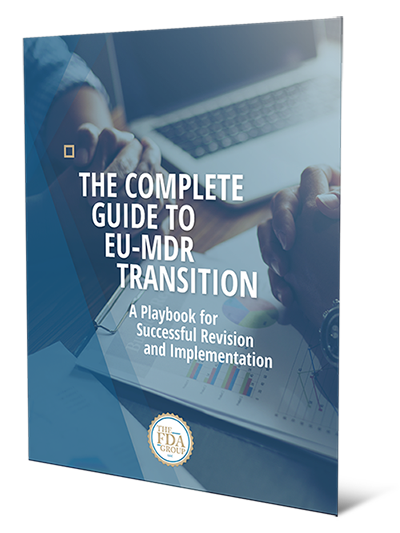Some of the most significant regulatory changes affect clinical evaluation for devices. Perhaps the most fundamental of these changes is the inclusion of a definition for the term itself—something not provided in the MDD.
According to the MDR, a clinical evaluation is a systematic and planned process to continuously generate, collect, analyze, and assess the clinical data pertaining to a device in order to verify the safety and performance, including clinical benefits of the device when used as intended by the manufacturer.
Free White Paper: The Complete Guide to EU-MDR Transition
Changes in Clinical Requirements
MDD CLINICAL REQUIREMENTS (ANNEX X)
As a general rule, confirmation of conformity with the requirements concerning the characteristics and performances referred to in Sections 1 and 3 of Annex I, under the normal conditions of use of the device, and the evaluation of the side-effects and of the acceptability of the benefit/risk ratio referred to in Section 6 of Annex I, must be based on clinical data.
MDR CLINICAL REQUIREMENTS (ARTICLE 10)
Manufacturers shall conduct a clinical evaluation in accordance with the requirements set out in Article 61 and Annex XIV, including a PMCF.
⬇⬇⬇
Confirmation of conformity with relevant general safety and performance requirements set out in Annex I under the normal condition of the intended use of the device, and the evaluation of the undesirable side-effects and of the acceptability of the benefit-risk ratio referred to in Sections 1 and 8 of Annex I, shall be based on clinical data providing sufficient clinical evidence, including where applicable relevant data as referred to in Annex III.
What Does “Clinical Data” Mean?
MDD DEFINITION
“Clinical data” is the safety and/or performance information generated from the use of a device.
MDD CLINICAL DATA SOURCES
- Clinical investigation(s) of a particular device; or
- Clinical investigation(s) or other studies reported in scientific literature, of a similar device with demonstrated equivalence; or
- Published and/or unpublished reports on other clinical experience of either a particular device or a similar device with demonstrated equivalence.
MDR DEFINITION
“Clinical data” is information concerning safety or performance that is generated from the use of a device.
MDR CLINICAL DATA SOURCES
- Clinical investigation(s) of a particular device, or
- Clinical investigation(s) or other studies reported in scientific literature, of a similar device with demonstrated equivalence; or
- Reports published in peer reviewed scientific literature on other clinical experience of either a particular device or a similar device with demonstrated equivalence; or
- Clinically relevant information coming from post-market surveillance, in particular the post-market clinical follow-up
MDR “CLINICAL PERFORMANCE” DEFINITION
“Clinical performance” is the ability of a device, resulting from any direct or indirect medical effects which stems from its technical or functional characteristics, including diagnostic characteristics, to achieve its intended purpose as claimed by the manufacturer, thereby leading to a clinical benefit for patients, when used as intended by the manufacturer.
MDR “CLINICAL BENEFIT” DEFINITION
“Clinical benefit” is the positive impact of a device on the health of an individual, expressed in terms of a meaningful, measurable, patient-relevant clinical outcome(s), including outcome(s) related to diagnosis, or a positive impact on patient management or public health.
Grab our free white paper and learn other important changes in the EU-MDR as well as a step-by-step guide to effective transition.



